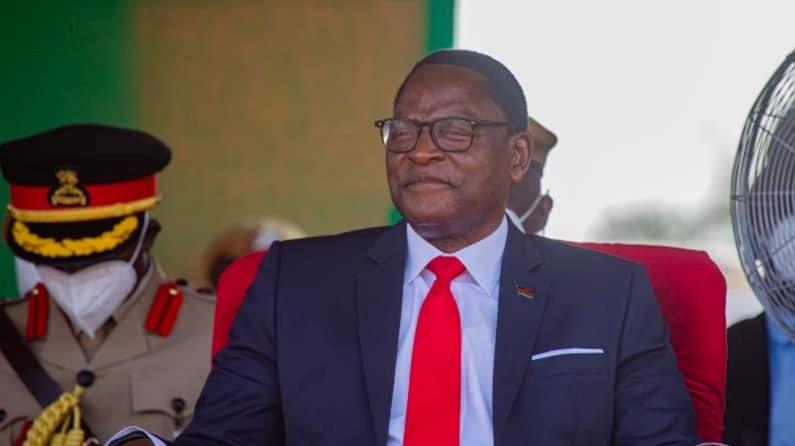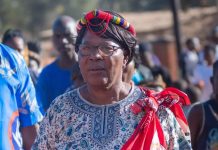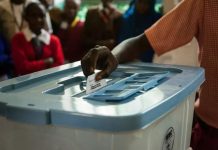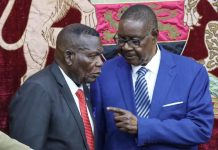Africa-Press – Malawi. Some weeks ago, I ran a three-part series extract of President Lazarus Chakwera’s speech on 8 December 2016 as Leader of Opposition. The intention, as I stated, was for us to interrogate Chakwera’s presidency this far using the same lens with which he critiqued his predecessor, Professor Peter Mutharika.
Due to time-sensitive developments requiring instant analysis, I pended the conclusion, i.e. my take. As a result, I kept you in suspense. Apologies. Today I am here to make amends. Before I start, let me say a word about the leadership next door. But before I proceed, a paragraph or two on the context will be helpful.
Zambia and Malawi are similar in many respects. Those that have travelled to Zambia (and other countries) will agree with me that it is when one is visiting or passing through Zambia that the fact that we are one people that were forcibly divorced at the Berlin Conference becomes evident.
We have similar geographical features, weather patterns, food, political trends, languages, tribe, and many Zambians can trace their parentage to Malawi.
I can add more: we are both landlocked, and one would expect that we would be equally affected by the Covid19 pandemic and, of course, the Russia-Ukraine war.
By the way, the adverse impact of the Russia-Ukraine war is real. A recent report by McKinsey titled “War in Ukraine: Twelve disruptions changing the world” attests to this. McKinsey aptly observes that “the effects [of the war] are universal but will be felt most acutely by the poorest, who already struggle to cover the cost of life’s necessities.” Reference to “the poorest” applies to both people and countries, and Malawians and Malawi, Zambians and Zambia are strong, if not undisputable candidates for this category.
Context thus set, let’s get started. The other day, Zambia’s President Hakainde Hichilema met the heads of Zambia’s Ministry of Local Government and Rural Development in Lusaka. The theme of his address was prudent financial management. He challenged the leaders to begin living within the means of their institutions and to prioritise the right priorities.
“IF you want to drive a V8, buy your own. Why do you want to pretend? You know that you cannot afford a V8, but you want to be driving a V8 because it is the taxpayers footing the bill?” Something to that effect.
He cited examples of how he refused to be subdued by the demons that attack newly elected poor countries’ presidents and condemned extravagance at the expense of real priorities that can improve Zambians’ livelihoods.
Compare this with President Chakwera’s talk of austerity the other day. Our president’s speech was so well written that no one can fault the diction. Secondly, our president read it so wonderfully that even his most acerbic hater can not fault the delivery.
The problem, however, is that over two years into his reign, everyone knows that President Chakwera is all talk but no trousers. Although this is disappointing, it is not the worst thing about this government. Let me share a recent experience recounted to me by a young doctor working at a central hospital.
It was a typical workday, and the doctor is dutifully attending to patients. Eventually, the doctor faces a woman from one of our townships who has brought a very sick baby. The woman explains the issues: fever, trouble breathing, and nightlong crying. The doctor’s diagnosis is pneumonia and gives a panadol and antibiotic prescription.
“This is the prescription, now hurry, go and buy at the pharmacy,” says the doctor.
“Which pharmacy Doc, this or the other one?” asks the woman, thinking the doctor is referring to the hospital pharmacy, where panadol and antibiotics used to be available once upon a time.
“No,” the doctor patiently explains, “you should take a minibus and go into town, drop at this place, and you will find a pharmacy there. Ask them for water and give the kid the first dose immediately.”
“How much will this cost?” asks the woman.
“Between MK2,500 to MK4,000”, responds the doc. You know how our mothers’ chitenje doubles as a wallet? The woman unties one corner of her chitenje and counts her fortune. It totals MK1,500.
She turns to the doctor and pleads, “Doctor, please prescribe only half the dosage; that’s what I can afford.” The doctor holds back tears and asks a nurse to go to the wards to grab penicillin and panadol tablets and give them to the baby. The nurse does that.
The doctor had MK5,000 for personal use, folks it out, and donates to the woman with instructions to buy the complete prescription because her baby’s pneumonia will not heed half measures. The woman, lost for words, goes on her way.
The question is, or rather the questions, are many. How many such women and sick babies are out there? How many can even reach a hospital? How many doctors have this doctor’s heart? And how many patients and poor mothers can such doctors – God bless their hearts – support with cash every day?
How many litres of fuel does a minister, a principal secretary or a presidential advisor get per month? Do they need that much fuel? How much does that translate to in Kwacha? How many panadol and penicillin tablets would a month’s worth of fuel for one minister, principal secretary, or presidential advisor buy? How many babies would get treated without their mother asking doctors to “halve” the dosage?
Let’s say the Russia-Ukraine war ends today, would this change? No. Because a lot of our problems are structural and greed-made. They need common sense and a brave leader who refuses to be captured. They need a compassionate leader who, upon assuming high office, will not forget what he used to criticise his predecessor for.
Our dire situation does not need leaders who, when in opposition, are aware of the suffering of most of our people, only to completely forget them when captured by the trappings of power.
Now, if you read the three-part series whereby President Chakwera as Leader of Opposition, incisively and eloquently spoke about our woes, how do we reconcile his failure to fix the basics?
Is it mission impossible? When did he become aware that it was mission impossible? How come? After all, his moving eulogy at Magufuli’s funeral is a testament to the fact that he knows that courage was the most significant factor in the late Magufuli’s success.
Times have changed, perhaps? If yes, how come next door, knowing that the Russia-Ukraine War is not an excuse but a cause for business unusual, President HH is grabbing the bull by the horns and scratching the exact point itching?
You know what? Although I detest incompetence, I can sometimes conjure the patience to live with it. But hypocrisy, I find a hard pill to swallow. And any analysis of Chakwera’s criticism of his predecessor versus Chakwera’s leadership, this leads one to conclude that Chakwera is either a hypocrite or a failed leader. The choice is yours.
For More News And Analysis About Malawi Follow Africa-Press






